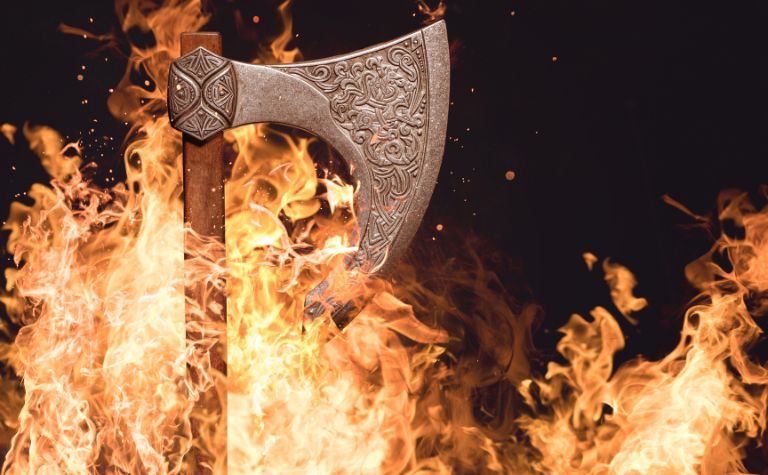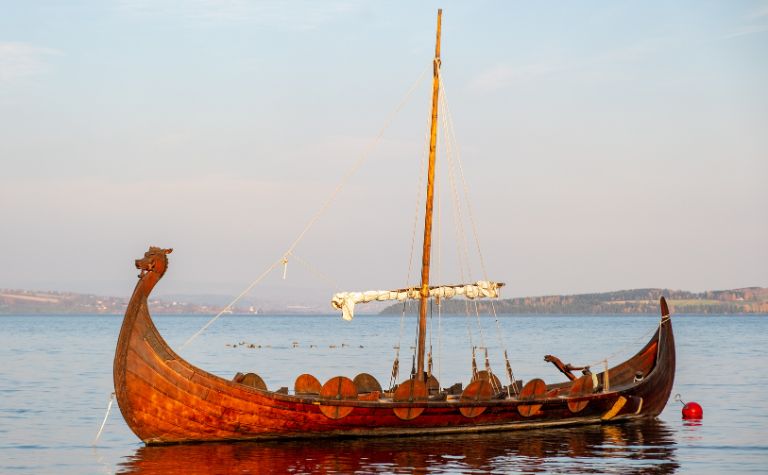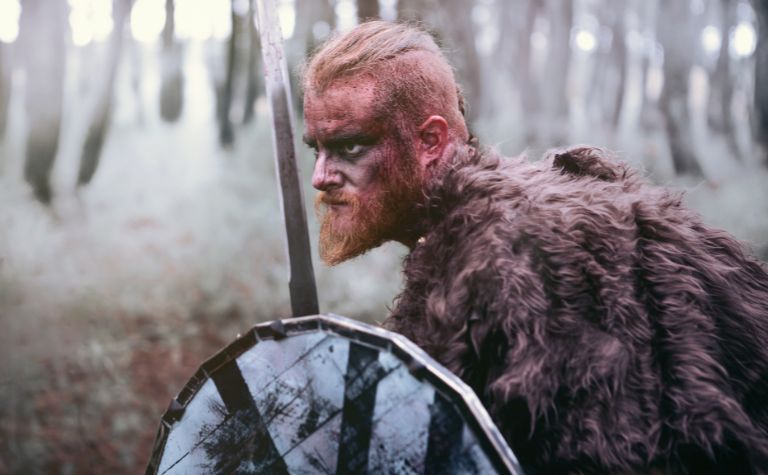To fully appreciate Valhalla, a crucial element in Norse mythology, it’s vital to explore its literal meaning and the role it plays within this ancient belief system.
Let’s explore its etymology, location, and the warriors who call it their eternal home.
Valhalla, meaning ‘the Hall of the Slain’ in Old Norse, is located in Asgard, home of the gods.
It’s where brave warriors, called Einherjar, reside after death, chosen by Valkyries for their courage in battle.
What is the literal and symbolic meaning of Valhalla? How is Vallhala depicted in Norse mythology and in modern popular culture?
Keep reading to learn the answer to these questions and others.
Also, see Are All Scandinavians Descendants of the Vikings? to learn more.

Valhalla in Norse Mythology: The Literal Meaning
To appreciate the full significance of Valhalla, we must start by understanding its literal meaning and its place in the realm of Norse cosmology.
Valhalla, derived from Old Norse, is a compound word. ‘Valr’ means ‘the slain’ or ‘the dead in battle’, and ‘hǫll’ translates to ‘hall.’
Put together, Valhalla translates to ‘the Hall of the Slain’, indicating its role as the resting place for warriors who have died in battle.
In terms of its physical location, Valhalla is believed to be situated in Asgard, one of the Nine Worlds in Norse mythology.
Asgard is primarily known as the dwelling place of the Aesir, a group of gods that includes well-known figures like Odin and Thor.
Valhalla is often depicted as a grand and vast hall, having shields for its roof, spears for its rafters, and armor-clad warriors feasting and celebrating within its walls.
The inhabitants of Valhalla are known as the Einherjar.
These are the warriors who’ve died bravely in battle and have been chosen by the Valkyries, Odin’s warrior maidens, to reside in Valhalla.
The Valkyries bring the fallen warriors to Valhalla, where they continue to live a warrior’s life—fighting during the day and feasting at night.
Understanding the literal meaning of Valhalla, its location within Norse cosmology, and its inhabitants gives us a foundation for grasping its symbolic significance, which we will explore in the next section.

The Symbolic Significance of Valhalla
While the literal meaning of Valhalla paints a vivid picture, its symbolic significance provides a deeper understanding of Norse cultural beliefs and values.
Valhalla embodies the Norse concept of honor and glory. It’s not just any warrior who gains entry to this hall, but only the bravest of the brave.
This selective process reflects the Viking warrior ethos, which placed a high value on courage and valor in battle.
The promise of a place in Valhalla motivated warriors to fight bravely, upholding their honor even unto death.
Moreover, Valhalla represents a unique perspective on the afterlife. Instead of a peaceful, serene paradise, the Norse envisioned an afterlife of continued fighting and feasting, echoing their own earthly existence.
The cycle of battle and celebration in Valhalla encapsulates the Norse respect for resilience and revelry.
Lastly, Valhalla plays a crucial role in the prophesied events of Ragnarök, the final battle in Norse mythology.
The warriors in Valhalla, the Einherjar, are destined to fight alongside the gods in this cataclysmic event.
This destiny underlines the importance of preparedness and duty, further reflecting the values of the Viking warrior culture.
In these ways, Valhalla is much more than a hall for slain warriors—it’s a symbol of Norse ideals of bravery, honor, resilience, and duty.
Its depiction in Norse mythology offers a window into the worldview of the ancient Norse people.

Valhalla in Modern Interpretations and Pop Culture
Valhalla’s allure has extended far beyond the ancient Norse world, finding its way into modern interpretations and pop culture.
Its concept and imagery have been adopted and adapted in various forms of media, reflecting a sustained interest in Norse mythology.
In literature, Valhalla has often been a backdrop or a pivotal plot point in fantasy novels.
Works like Rick Riordan’s “Magnus Chase and the Gods of Asgard” series portray Valhalla, providing a modern twist to its ancient origins.
Here, the themes of bravery and honor still resonate, while new elements aligned with the contemporary context are introduced.
In film and television, too, Valhalla has featured prominently. Movies like “Thor: Ragnarok” and series like “Vikings” include references to Valhalla, showcasing the allure of the Norse afterlife to new audiences.
These depictions range from being closely aligned with traditional Norse beliefs to presenting more stylized, fantastical versions of Valhalla.
Perhaps most prominently, Valhalla has found a home in the world of video games.
Titles like “Assassin’s Creed Valhalla” allow players to immerse themselves in a detailed, interactive recreation of the Viking world, with Valhalla as a central element.
Despite the variation in these modern interpretations, the core symbolism of Valhalla—as a place of honor for the brave, a reflection of the Viking warrior ethos, and a unique vision of the afterlife—remains.
The popularity of Valhalla in modern pop culture attests to the enduring appeal of these ancient beliefs and values.
It’s a testament to how Norse mythology continues to capture the imagination, providing intriguing material for stories and world-building in our contemporary landscape.
Conclusion
To wrap up our exploration, we’ve seen that Valhalla, known as the ‘Hall of the Slain,’ carries rich meaning both in its literal and symbolic interpretations.
It serves as a grand abode for the bravest warriors in Norse mythology, reflecting the Viking culture’s values of bravery, honor, and resilience.
Moreover, its role extends beyond a mere afterlife destination, offering a unique insight into the Norse understanding of life, death, and destiny.
The idea of Valhalla encourages courage in battle and the continual striving for glory, reflecting a warrior’s lifestyle.
In modern times, Valhalla continues to captivate, finding its way into literature, movies, TV shows, and video games.
These reinterpretations often keep the essence of Valhalla while adding new perspectives, demonstrating the versatility and enduring appeal of Norse mythology.
